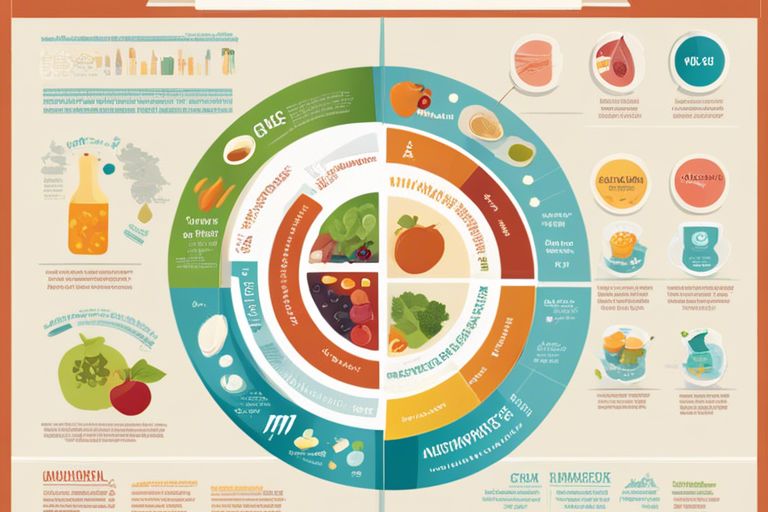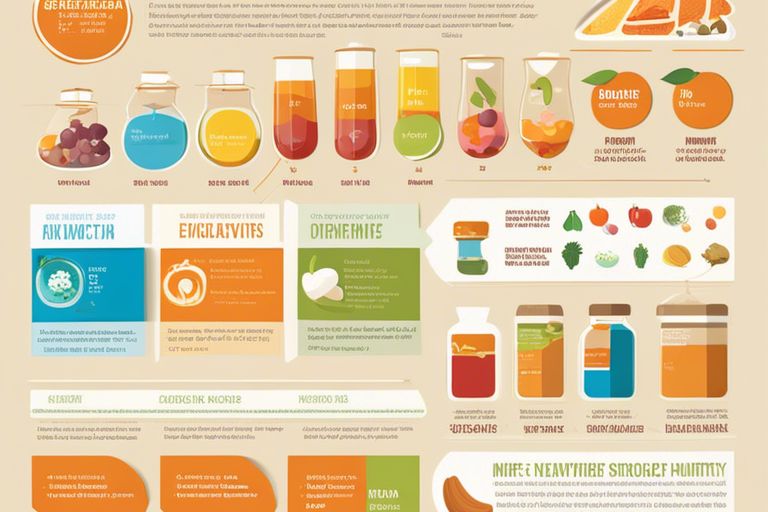Nutrition is the foundation of our health, fueling our bodies with essential vitamins and minerals necessary for proper function. Understanding our dietary requirements can significantly impact our well-being, from boosting our immune system to preventing chronic diseases. Vitamins A, C, D, and iron, calcium, and potassium are vital for various bodily functions, and deficiencies can lead to a range of health issues. By delving into the world of nutrition, we uncover the intricate mechanisms that dictate our dietary needs and pave the way to a healthier lifestyle.
Key Takeaways:
- Vitamins and minerals are essential for overall health: These micronutrients play crucial roles in various bodily functions, from energy production to immune support.
- Dietary needs vary among individuals: Factors like age, gender, and lifestyle can impact an individual’s nutritional requirements, highlighting the importance of personalized nutrition plans.
- Balance is key: Consuming a diverse range of nutrient-dense foods is crucial to ensuring you meet your body’s vitamin and mineral needs without overconsuming any particular nutrient.

The Micronutrient Cosmos
If we were to zoom into the world of nutrition, we would encounter a realm of minuscule yet mighty entities known as micronutrients. These essential substances include vitamins and minerals that play a crucial role in maintaining our health and well-being. While they may be required in tiny amounts, their absence or imbalance can have profound effects on our bodies.
The Alchemy of Vitamins
Alchemy in the realm of nutrition takes the form of vitamins, organic compounds that are essential for various biological processes. These molecules act as cofactors for enzymatic reactions, ensuring that essential functions like metabolism, immune response, and cell repair proceed smoothly. From the sunlight-produced vitamin D to the antioxidant powers of vitamin C, each vitamin has a unique role to play in the symphony of our cells.
Deficiencies or excesses in vitamins can lead to a myriad of health issues, from fatigue and vulnerability to infections to neurological disorders and impaired wound healing. Knowing the right balance and dietary sources of these vital nutrients is key to optimizing our health and ensuring our bodies function at their peak.
Minerals: The Bedrock of Wellbeing
Any discussion on nutrition would be incomplete without delving into the world of minerals, the inorganic elements that form the bedrock of our well-being. These essential nutrients play key roles in bone health, fluid balance, nerve function, and muscle contraction, among other critical functions. From calcium and magnesium to zinc and iron, minerals are the silent heroes that keep our bodies ticking.
Wellbeing hinges on maintaining the right levels of minerals, as deficiencies or excesses can lead to serious health consequences. For example, iron deficiency can result in anemia, while too much sodium can contribute to high blood pressure. Striking the right balance through a varied and nutrient-rich diet is crucial for ensuring our bodies operate in harmony.
Dietary Constellations
Any exploration of the science of nutrition must involve an understanding of dietary constellations, the intricate combinations of nutrients present in the foods we consume. These constellations determine our health outcomes, energy levels, and overall well-being. By studying the composition of our diets, we can unlock the mysteries of how different nutrients interact within our bodies.
Mapping Macronutrient Galaxies
For optimal health, it is crucial to map out the macronutrient galaxies within our diets. These galaxies consist of carbohydrates, proteins, and fats, each playing a unique role in fueling our bodies and sustaining vital functions. Carbohydrates provide quick energy, proteins are the building blocks of tissues, and fats support cell structure and hormone production. By understanding the balance of these macronutrients, we can tailor our diets to meet our individual nutritional needs.
Deciphering Dietary Patterns
With scientific precision, we can decipher the dietary patterns that influence our health outcomes. These patterns reflect our food choices, portion sizes, and meal timings, all of which impact our nutritional status. By analyzing these patterns, we can identify potential deficiencies or excesses in our diets and make necessary adjustments to optimize our health.
With advancements in nutritional science, researchers can now research deeper into deciphering dietary patterns by using innovative technologies and analytical tools. These methods allow for a more comprehensive evaluation of our diets, revealing hidden trends and associations that may affect our well-being in the long term.
The Dynamics of Digestion
After the process of ingestion, food launchs on a remarkable journey through our digestive system. This journey is not merely a passive trip but a complex series of events orchestrated by a combination of enzymes, metabolic pathways, and physiological processes designed to extract essential nutrients from the food we consume.
The Enzymatic Universe Within
On a microscopic level, the human body houses an enzymatic universe within the gastrointestinal tract. Enzymes are protein molecules that act as biological catalysts, facilitating and speeding up chemical reactions necessary for the breakdown and absorption of nutrients. These enzymes work in harmony to break down complex carbohydrates, proteins, and fats into simpler molecules that can be readily absorbed and utilized by the body.
Enzymes like amylase, protease, and lipase play critical roles in the digestion process, each targeting specific nutrients to ensure efficient breakdown. Without these enzymatic reactions, the body would struggle to extract essential vitamins, minerals, and macronutrients from food, leading to nutrient deficiencies and impaired metabolic functions.
Metabolic Pathways as Celestial Orbits
Pathways within our cells resemble the celestial orbits in the cosmos, intricate and precise in their functioning. Metabolic pathways involve a series of interconnected chemical reactions that transform nutrients into energy, building blocks for cells, and molecules essential for cellular functions. These pathways are tightly regulated to ensure a balance between energy production and storage, essential for overall health and wellbeing.
For instance, the Krebs cycle, also known as the citric acid cycle, is a fundamental metabolic pathway that generates energy in the form of adenosine triphosphate (ATP) from carbohydrates, fats, and proteins. This cycle is a central hub of energy production in our cells, demonstrating the intricate dance of biochemical reactions that sustain life.

Nourishment Evolution
Your journey into the intricate world of nutrition begins with understanding the evolution of nourishment. From the early days of human existence to the modern era, our dietary needs have evolved alongside us, shaping our understanding of the science of nutrition.
Historical Perspectives on Human Diet
The study of historical perspectives on human diet provides valuable insight into how early humans sourced and consumed food. Our ancestors relied on a diet primarily composed of plants, fruits, nuts, and occasional meat from hunting. This balanced approach to nutrition ensured they received essential vitamins and minerals necessary for survival in a harsh environment.
As societies evolved and agriculture developed, human diets diversified to include grains, dairy, and processed foods. These changes led to both positive and negative impacts on human health, underscoring the importance of a well-rounded diet rich in essential nutrients.
The Adaptation of Nutritional Science
The field of nutritional science has adapted to the ever-changing landscape of human dietary needs, offering valuable insights into the role of vitamins, minerals, and macronutrients in maintaining optimal health. Researchers continually explore new discoveries in how nutrition affects our bodies at a cellular level, paving the way for innovative dietary guidelines and recommendations.
Science has uncovered the detrimental effects of nutrient deficiencies and excess on human health, highlighting the importance of balanced nutrition for overall well-being. By staying informed on the latest research and advancements in nutritional science, we can make informed choices that support our health and longevity.
Final Words
Now that we have explored into the intricate world of nutrition, vitamins, minerals, and dietary needs, we can appreciate the complex web of interactions that exist between our bodies and the food we consume. Just like the laws that govern the universe, the principles of nutrition govern our health and well-being. By understanding the science behind what we eat, we can make informed choices that impact our lives in profound ways. So let us continue to explore, question, and learn about the fascinating world of nutrition to unlock the secrets of optimal health and longevity.
FAQ
Q: What are vitamins and why are they important for our health?
A: Vitamins are essential organic compounds that our bodies need in small amounts to function properly. They play a crucial role in various biochemical processes that are necessary for growth, development, and overall health. Without adequate intake of vitamins, deficiency diseases can occur.
Q: How do minerals benefit our bodies and what are some important minerals to include in our diet?
A: Minerals are inorganic substances that are vital for maintaining good health and functioning of the body. They play important roles in processes such as bone formation, enzyme function, and nerve transmission. Some key minerals that are essential for our well-being include calcium, iron, magnesium, and zinc.
Q: What are dietary needs and how can we ensure we are meeting them through our diet?
A: Dietary needs refer to the specific nutritional requirements that our bodies have to stay healthy. It is important to consume a balanced diet that includes a variety of foods to ensure adequate intake of vitamins, minerals, and other essential nutrients. A diet rich in fruits, vegetables, whole grains, lean proteins, and healthy fats can help meet our dietary needs and promote overall well-being.

